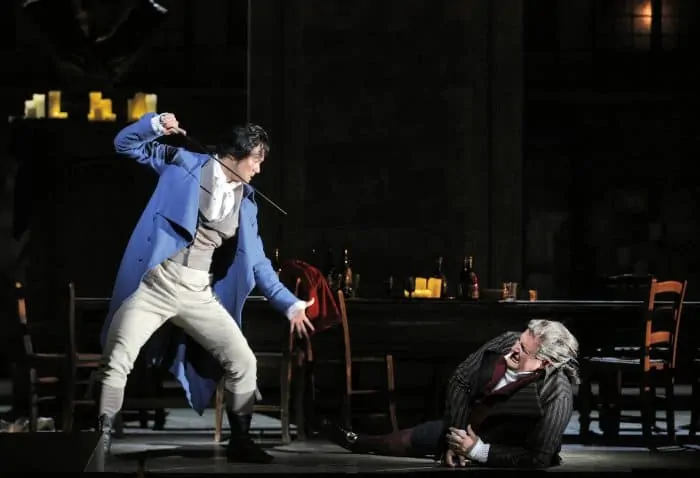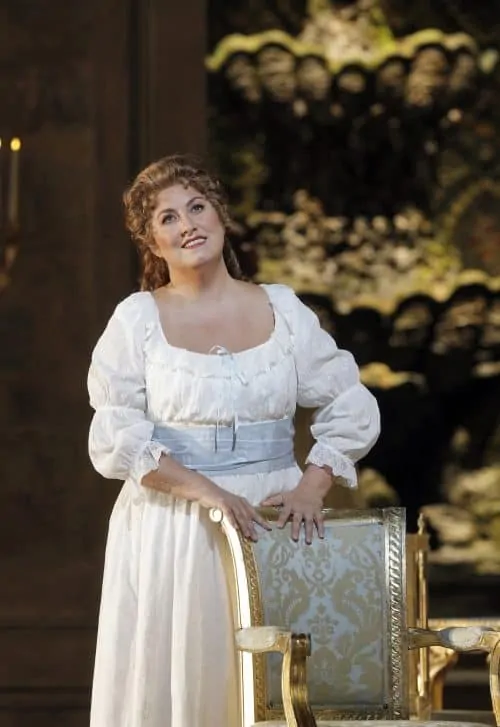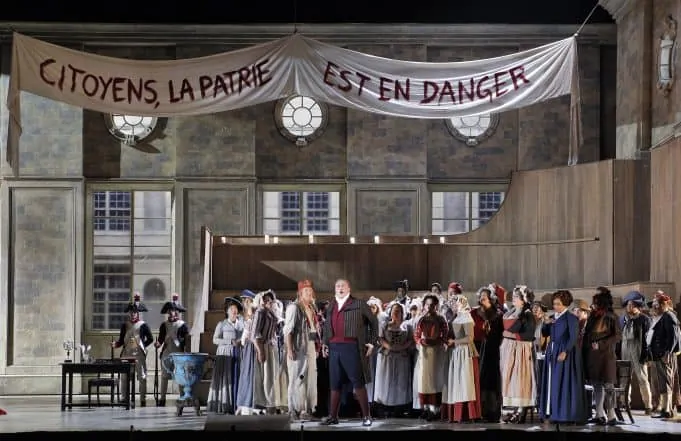Andrea Chénier is a melodrama of the French revolution, based on the false tales of a real poet’s love affair with an aristocrat. The poet Chénier loves the ideals of the revolution but condemns its violent excesses. He is accused of treason by Gérard, a functionary in the new government who is jealous of Chénier’s and Maddalena’s love. (Before the revolution, Gérard was a servant in Maddalena di Coigny’s house and fell madly in love with her.) Gérard repents of his accusation and tries to save Chénier, but it is too late. The poet is guillotined, and Maddalena takes the place of another condemned woman in order to die with him.
The opera itself is infrequently performed, and for good reason. Giordano’s score is loud and uneven, Puccini-like in style without the same depth of emotion. The plot is oddly paced, with some scenes trudging along while other, key events rush by. It’s also a difficult opera to cast because of the heavy vocal demands on the three lead singers. It takes extraordinary talent to make this an opera worth producing.
The cast at San Francisco Opera comes close. As the titular poet, Yonghoon Lee showed off a muscular tenor with surprising stamina. The pushed, almost-shout-like quality of his voice had me constantly worried that it would simply give out. To his credit, he sounded as fresh at the end of the evening as the beginning. He even mellowed a bit in the final act, introducing some dynamics softer than forte into his aria “Come un bel dì di maggio”. Playing his beloved Maddalena, soprano Anna Pirozzi was announced as sick but didn’t sound it. Her voice shimmered, gaining particular sweetness and power in her big third-act aria “La mamma morta”. The couple sounded excellent together in their duets, though their chemistry onstage left much to be desired.

George Gagnidze played Gérard, the revolutionary torn by his passion for Maddalena. A rough, stuttering quality to his sound smoothed out by the third act, when he delivered a touchingly expressive “Nemico della patria” with a commanding ending. It’s a shame we heard nothing more from him in the act—not because he had nothing to sing, but because the orchestra consistently drowned him out. His voice is a touch too soft for the War Memorial Opera House, especially with Luisotti on the podium.

Andrea Chénier also has a dizzying array of secondary characters with star turns. All of the smaller roles were well filled. I particularly enjoyed Jill Grove’s buttery mezzo-soprano as Madelon, a grandmother sacrificing her last family member to the war effort, and Joel Sorenson’s exuberant villainy as The Incredible, a spy. Other notable contributions came from J’Nai Bridges as Bersi, David Pershall as Roucher, and Catherine Cook as the Contessa di Coigny. The chorus clearly had fun with the show, where they played everything from shepherdesses to tricoteuses. They sang sweetly and clamored noisily with equal skill. Under Nicola Luisotti’s baton, the San Francisco Opera Orchestra played a spritely overture but lapsed into excess (of volume and of schmaltz) as the opera continued.
David McVicar’s production is traditional and opulent. Every detail is just right, from the graffiti on the walls to the lighting of the chandeliers and streetlamps. The blood-dipped tricolor curtain sports Robespierre’s comment on Chénier’s death warrant: “Even Plato banished poets from his Republic”. The costumes (by Jenny Tiramani) could be a museum exhibit of late-eighteenth-century dress styles. What the singers do on the stage doesn’t always convince—there are a few misfires that cause head-scratching (a mob held back by a couple servants and Gérard’s half-hearted attempt to grab Maddalena come to mind)—but there’s never a shortage of beautiful things to look at.
You can’t help leaving this Andrea Chénier admiring what a good job San Francisco Opera has done with a tricky piece. But the production and performances aren’t extraordinary enough to explain why they chose this opera in the first place, when there are so many better ones in the repertoire.
3/5



